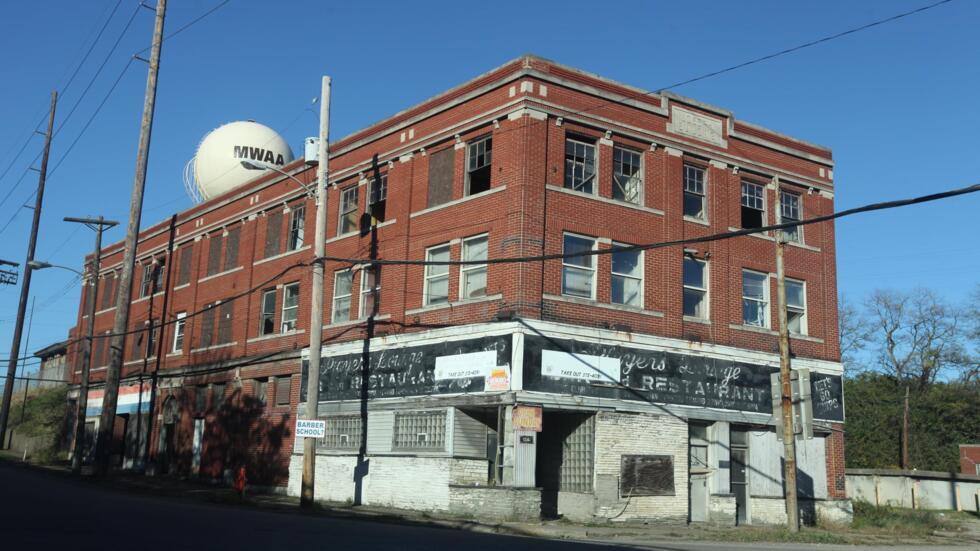After the biggest steel mills in the world left Pennsylvania
Beaver County, Pennsylvania, was once home to the largest steel mills in the world, feeding US industry through transport arteries such as the Ohio River and a mighty railroad network. When the steel barons decided to pack their bags, they left the area in economic disarray. Jan van der Made reports from Beaver
Issued on: Modified:

The grass perks around the wooden villas in New Brighton, Beaver County, are well kept, and on the surface at least, this seems a reasonably affluent outpost located between the Beaver River and the mighty Ohio.
But looks can be deceiving.
“There are a lot of single mums supporting themselves by working at nursing homes,” says Tina Shannon, who runs a children’s day-care center from her home, adding that the population count in the town has gone down steadily since the 1980’s.
“And they are living in small apartments, and they are very poor. They work for a year or two and they got a cheap car, because there is no public transportation around here. And then the car will break down and they lose their job.”
Tina grew up in New Brighton in a family working in professions related to the steel industry and saw the region transform from riches to rags.
Just fifty years ago the town had a bustling social and family life.
“Steelworkers would send their kids to college, the kids had piano lessons, and dance lessons, and there was plenty of tax money in the local schools,” she says.
“When you think about the fifties and the heyday of the American dream: this county was it. This was where it was happening.”

Ten kilometers away from New Brighton is the town of Aliquippa, once home to one of the largest steel mills in the world, the Jones and Laughlin Steel Company, a major competitor to Andrew Carnegies’ steel empire.
But the streets are now home to buildings that are falling down and social housing projects where local youth hang around, seemingly listless.
In the eighties, the steel industry collapsed overnight.
“There was not a lot of warning,” says Tina. “Hundreds of people would be laid off, just like that one year. A year later many couldn’t pay their mortgages anymore, some got fired “right before Christmas,” she says.
“We used to have a tightly knit community. We had traditions, churches. And then suddenly people couldn’t even make a living. Then came the home foreclosures, and there were a lot of suicides, and fighting in families.
Tina’s husband Randy was lucky to keep his job as laboratory manager with a company that specializes in waste treatment.
Fighting back
Touched by the fate of the steelworkers he became active in helping them fighting the foreclosures that were often accompanied by a public auction at the office of the Sheriff to generate money to pay the outstanding debts.

“We got people together at the Sheriff’s to disrupt the sale,” says Randy, “Usually there is half a dozen bank vampires who were there to take your land, so we have a dozen laid off steel workers who were elbowing people and shouting and just moving around, making the sale impossible.”
As a result the Sheriff cancelled the auction. And in the end Randy managed to force through legislation that put a moratorium on the foreclosures to give people some breathing space.
After years of rising unemployment figures in a population that was decreasing, areas around New Brighton were opened to fracking, a drilling technique that involves extracting gas by fracturing rock using a pressurized liquid.
“Fracking brought a lot of investment and that created some jobs, and that is positive” says Randy. But he points out that sound regulations were never put in place and chemicals in the liquid polluted drinking water and increasing the risk of cancer.
“We don’t drink from the tap. It is contaminated and the disinfectant is not regulated by the Environmental Protection Agency so the water is not safe,” he says.
But for many in the region, bottled water is too expensive to buy.
Meanwhile, like the rest of the US, the beat down population of Beaver County goes to the polls on November 8, but not with much enthusiasm.
Randy thinks that Clinton’s ideas to develop the region are “interesting,” suggesting a fiscal stimulus package.
Both he and Tina flatly reject Donald Trump’s suggestion that he will “bring back the steel” to the region.
“People are economically desperate,” says Tina. "If you offer them a dream, they are going to want to believe in it. Donald Trump is being very cruel as he is lying to desperate people.”
“If it was true that we could bring steel back, I would be fighting for that. But even if steel were to come back, the whole process has changed. It is not going to ever be the way it was with steel,” she says.
Daily newsletterReceive essential international news every morning
Subscribe